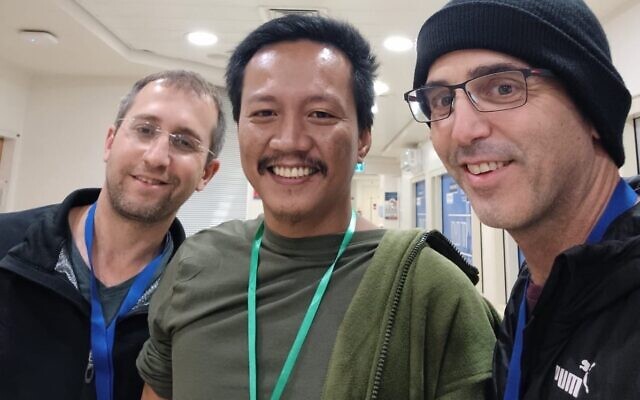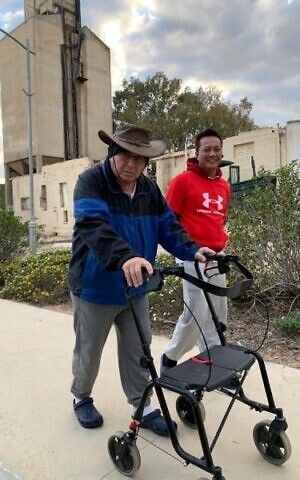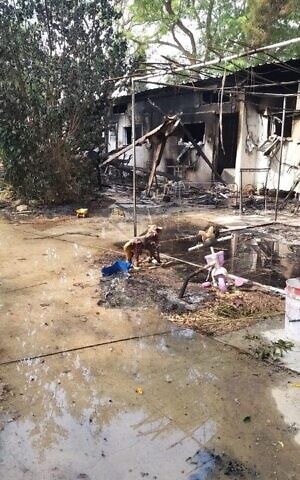Atlanta Israeli Monitors Release of Hostages from Kibbutz
His father’s Filipino caregiver was freed on the first day of temporary truce.

On Friday, Nov. 24, the first day of the temporary truce that Israel agreed to with the terrorist organization Hamas, 13 Israeli hostages were freed along with 10 Thai workers and one Filipino caregiver. Twelve of the 13 either lived on Kibbutz Nir Oz or were visiting family members there. The Filipino, Gelienor “Jimmy” Pacheco, 33, worked for the family of Atlantan Avishay Ben Zvi for four years, caring for his father Amitai, 80, who was murdered when Hamas stormed Israel Oct. 7, viciously murdering, raping, burning and pillaging Israeli communities along the Gaza border.
“We were surprised he was released,” said Ben Zvi who lived on Kibbutz Nir Oz from the time he was about one year old until he was 25. He has lived in Atlanta for about a decade. “We saw him in the Red Cross pictures,” but Pacheco and the 10 Thai workers who were also released the first day were not on any lists of hostages released by Hamas.
“Jimmy is like a kibbutz member because he worked for the family,” emphasized Ben Zvi, who noted that his brothers Gilad and Ido greeted Jimmy at the hospital to which he was taken after his release. “He lost weight during his captivity,” said Ben Zvi. Malnourishment was common among the freed captives, including the 39 Israelis released on the first three days of the hostage exchange that also resulted in Israel freeing young and female prisoners in its jails. Three Palestinians were released for each Israeli hostage freed by Hamas.
The agreement called for 50 Israelis to be freed during the initial four-day truce. Some foreign nationals, not included in the agreement, were also released by Hamas.

By the end of the fourth day when 11 Israelis and two Thai workers were freed, of the 77 kidnapped from Kibbutz Nir Oz, 49 remained in captivity, according to Ben Zvi who was keeping track.
Ben Zvi’s father was born in the U.S., but lived in Kibbutz Nir Oz, founded in 1955 two miles from the Gaza border, most of his life. As reported by the AJT in October, Amitai Ben Zvi had a caregiver because he had Parkinson’s disease. In fact, it was Pacheco who managed to call a friend on Oct. 7 and tell her that Ben Zvi had been killed and that he was being kidnapped. That’s how Ben Zvi and his siblings were notified about their father’s death. It took nearly two weeks for the body to be identified because Israel had many bodies that needed identifying. Some 1,200 were killed that day, according to the State.
When Ben Zvi, his wife Shirley and twin daughters flew back to Israel for his father’s funeral, they visited a number of survivors of Kibbutz Nir Oz. Many have been housed in a hotel in the southern Israeli city of Eilat, while a few are staying with relatives in the center of the country. A large part of the kibbutz is uninhabitable because many homes were burned. Approximately one-fourth of the 400 residents were either killed or kidnapped on Oct. 7.
For Ben Zvi, it’s been a harrowing couple of months. Although he moved away from the kibbutz 25 years ago, he still considers the community his family. He is on two WhatsApp groups, one of which includes about 200 former residents who have moved away. The other group consists of the dozen or so people who grew up in his age cohort.
There were 11 children in the younger Ben Zvi’s cohort, born in 1973. Each age group was given a name; his group was called Erez, which means cedar in English. Illustrating the intertwining of Israelis – especially those on kibbutzim – Ben Zvi explains how he has been directly impacted by the Oct. 7 Hamas attack, in addition to suffering the death of his father.
“Roee Munder is my age and was murdered in the attack. His big sister Keren, his mother Ruth and his nephew Ohad were released” from Hamas captivity in the first batch of abductees freed. “His father is still missing.”
Yocheved Lifshitz was released by her captors on Oct. 23. “Her youngest son, Omri, is my age. His father Oded is still missing. Others my age who have their parents among the kidnapped include the mother of Nadav Sagi, Ada Sagi, and the father of Lior Peri, Haim Peri.” Also missing is Aviv Atzili, who is one year younger than Ben Zvi, and his wife Liat. However, Ravid Katz who is one year older than Ben Zvi has just been identified as having died on Oct. 7.

Two teenage children of Renana Yaakov, Or and Yagil, were released on day four of the truce, Ben Zvi added.
Ben Zvi said all of the former residents of Nir Oz are helping to support the kibbutz in any way they can, whether it is picking crops such as avocados, gathering food and clothes or providing transportation to the evacuated residents, helping the elderly or raising donations to help the survivors.
“It’s a strong community,” he said. “From far away, I can see that everyone is supportive of each other.” He added that his friends and relatives won’t give up on regaining the freedom of the rest of the hostages.
Estimates are that it will take three years to rebuild the kibbutz, but “not everyone will decide to return there. It’s very hard with the memories of those who died,” said Ben Zvi. Meanwhile, survivors of Kibbutz Nir Oz may live in apartments newly built in Kiryat Gat in southern Israel. There’s talk of building a community center for the residents who are accustomed to more communal living.
Ben Zvi primarily lived in a Beit Yeludim, or Children’s House, as he grew up. The children slept together and were educated together. They saw their parents for three hours a day. That was already different from how his father grew up, on another kibbutz, when he saw his parents only once a week.
During the four-day truce agreement between Israel and Hamas, which allowed the freeing of hostages abducted in Israel in exchange for Palestinians held in Israeli prisons, Israelis both inside Israel and abroad were glued to their TVs, radios or smart phones, anxious to hear which hostages – and in what condition – were being released. “We don’t usually have live TV on,” said Ben Zvi of his Atlanta-area household. But especially on the first day of hostage releases when a group from his kibbutz were freed, his family watched the handover from Hamas, to the Red Cross, and finally to Israeli authorities.
Because Israel is a relatively small country of some nine million people, despite their divisions based on religiosity, ethnic backgrounds and economic viability, nearly everyone knows someone who was either killed, injured or kidnapped – or related to those directly affected. That could help explain the results of a survey of Israelis conducted between Nov. 19-20 by the Viterbi Family Center for Public Opinion and Policy Research at the Jerusalem-based Israel Democracy Institute.
The survey results showed that releasing all the hostages was essentially as important to Israelis as toppling Hamas, the governing body of Gaza and the central combatants on Oct. 7. Of those two goals, along with the goals of restoring deterrence and distancing Gaza residents and creating a buffer zone between them and Israel, the release of the hostages scored higher at 49 percent, compared to toppling Hamas at 32 percent, restoring deterrence at 10 percent and distancing Gazans from Israel at only 3 percent.
At press time, it was announced that the temporary truce would be extended two more days, with more hostages released. The initial agreement said that Israel would extend the truce a day for every 10 more hostages freed.



comments